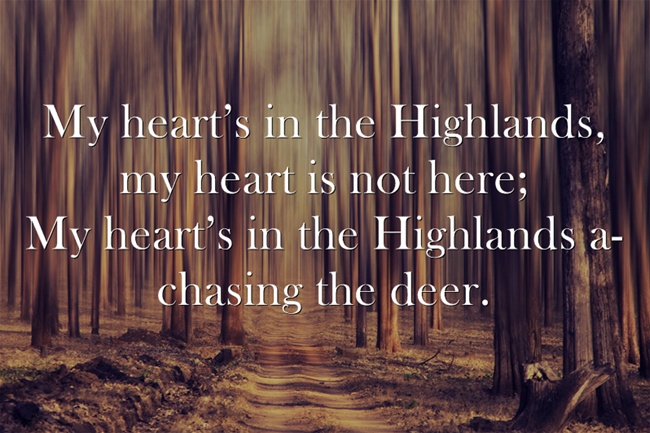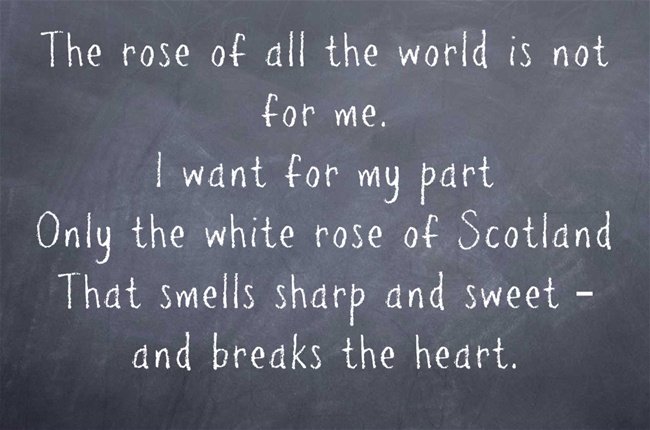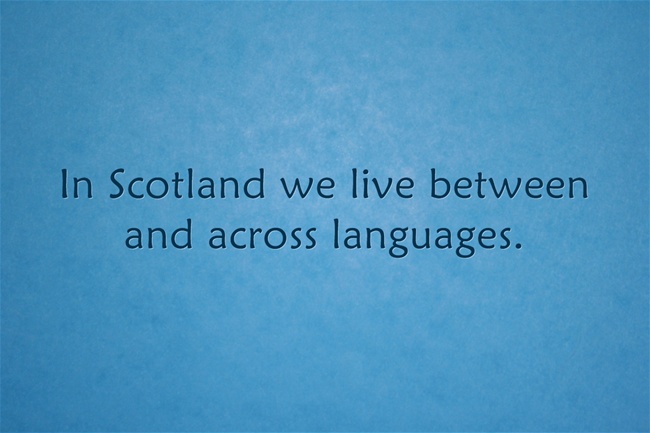new posts in all blogs
Viewing: Blog Posts Tagged with: oxford dictionary of quotations, Most Recent at Top [Help]
Results 1 - 10 of 10
How to use this Page
You are viewing the most recent posts tagged with the words: oxford dictionary of quotations in the JacketFlap blog reader. What is a tag? Think of a tag as a keyword or category label. Tags can both help you find posts on JacketFlap.com as well as provide an easy way for you to "remember" and classify posts for later recall. Try adding a tag yourself by clicking "Add a tag" below a post's header. Scroll down through the list of Recent Posts in the left column and click on a post title that sounds interesting. You can view all posts from a specific blog by clicking the Blog name in the right column, or you can click a 'More Posts from this Blog' link in any individual post.

By: SoniaT,
on 1/19/2015
Blog:
OUPblog
(
Login to Add to MyJacketFlap)
JacketFlap tags:
*Featured,
Rhetoric & Quotations,
martin luther king jr quotes,
mlk quotes,
Books,
Martin Luther King Jr. Day,
oxford dictionary of quotations,
elizabeth knowles,
martin luther king jr,
Add a tag
Each January, Americans commemorate the birthday of Martin Luther King, Jr., reflecting on the enduring legacy of the legendary civil rights activist. From his iconic speech at the 1963 March on Washington, to his final oration in Memphis, Tennessee, King is remembered not only as a masterful rhetorician, but a luminary for his generation and many generations to come. These quotes, compiled from the Oxford Dictionary of Quotations, demonstrate the reverberating impact of his work, particularly in a time of great social, political, and economic upheaval.
On courage:
“A riot is at bottom the language of the unheard.”
Where Do We Go From Here? (1967) ch. 4
“If a man hasn’t discovered something he will die for, he isn’t fit to live.”
Speech in Detroit, 23 June 1963, in James Bishop The Days of Martin Luther King (1971) ch. 4
“Cowardice asks the question, ‘Is it safe?’ Expediency asks the question, ‘Is it politic?’ Vanity asks the question, ‘Is it popular?’ But Conscience asks the question, ‘Is it right?’”
Speech, 1967; in Autobiography of Martin Luther King Jr. (1999) ch. 30
On equality:
“I have a dream that one day on the red hills of Georgia the sons of former slaves and the sons of former slave owners will be able to sit down together at the table of brotherhood…I have a dream that my four little children will one day live in a nation where they will not be judged by the colour of their skin but by the content of their character.”
Speech at Civil Rights March in Washington, 28 August 1963, in New York Times 29 August 1963; see also jackson 413:13
“Returning hate for hate multiplies hate, adding deeper darkness to a night already devoid of stars. Darkness cannot drive out darkness; only light can do that. Hate cannot drive out hate; only love can do that.”
Strength to Love (1963) ch. 5, pt. 2
On justice:
“Judicial decrees may not change the heart; but they can restrain the heartless.”
Speech in Nashville, Tennessee, 27 December 1962, in James Melvin Washington (ed.) A Testament of Hope: The Essential Writings of Martin Luther King, Jr. (1986) ch. 22
“Injustice anywhere is a threat to justice everywhere.”
Letter from Birmingham Jail, Alabama, 16 April 1963, in Atlantic Monthly August 1963
“We shall overcome because the arc of a moral universe is long, but it bends toward justice.”
Sermon at the National Cathedral, Washington, 31 March 1968, in James Melvin Washington A Testament of Hope (1991); see obama 571:3, parker 585:12
On inaction:
“The Negro’s great stumbling block in the stride toward freedom is not the White Citizens Councillor or the Ku Klux Klanner but the white moderate who is more devoted to order than to justice; who prefers a negative peace which is the absence of tension to a positive peace which is the presence of justice.”
Letter from Birmingham Jail, Alabama, 16 April 1963, in Atlantic Monthly August 1963
“We will have to repent in this generation not merely for the hateful words and actions of the bad people, but for the appalling silence of the good people.”
Letter from Birmingham Jail, Alabama, 16 April 1963
Image Credit: Tribute to Martin Luther King, Jr. Photo by U.S. Embassy New Delhi. CC by ND 2.0 via Flickr.
The post Martin Luther King, Jr. on courage, equality, and justice appeared first on OUPblog.


By: Connie Ngo,
on 12/16/2014
Blog:
OUPblog
(
Login to Add to MyJacketFlap)
JacketFlap tags:
slideshow,
oxford dictionary of quotations,
elizabeth knowles,
*Featured,
Images & Slideshows,
Rhetoric & Quotations,
Dictionary of Quotations,
Books,
winter,
Christmas,
snow,
Quotes,
images,
quotations,
holiday,
dictionary,
Add a tag
Winter encourages a certain kind of idiosyncratic imagery not found during any other season: white, powdery snow, puffs of warm breath, be-scarfed holiday crowds. The following slideshow presents a lovely compilation of quotes from the eighth edition of our Oxford Dictionary of Quotations that will inspire a newfound love for winter, whether you’ve ever experienced snow or not!
Are there any other wintry quotes that you love? Let us know in the comments below.
Headline image credit: Winter bird. Photo by Mathias Erhart. CC BY-SA 2.0 via Flickr. All slideshow background images CC0/public domain via Pixabay or PublicDomainPictures.net (1) (2) (3) (4) (5) (6) (7) (8) (9) (10).
The post 10 quotes to inspire a love of winter appeared first on OUPblog.


By: Hannah Paget,
on 9/27/2014
Blog:
OUPblog
(
Login to Add to MyJacketFlap)
JacketFlap tags:
WW1,
odnb,
first world war,
robert graves,
oxford dictionary of quotations,
elizabeth knowles,
*Featured,
Western Front,
centenary,
UKpophistory,
war poetry,
Rhetoric & Quotations,
Edward Grey,
Goodbye to All That?,
Kemal Atatürk,
Lena Guilbert Horne,
odq,
Wildred Owen,
Books,
History,
Language,
World,
world war I,
f. scott fitzgerald,
Add a tag
Coverage of the centenary of the outbreak of the First World War has made us freshly familiar with many memorable sayings, from Edward Grey’s ‘The lamps are going out all over Europe’, to Wilfred Owen’s ‘My subject is War, and the pity of war/ The Poetry is in the pity’, and Lena Guilbert Horne’s exhortation to ‘Keep the Home-fires burning’.
But as I prepared the new edition of the Oxford Dictionary of Quotations, I was aware that numerous other ‘quotable quotes’ also shed light on aspects of the conflict. Here are just five.
One vivid evocations of the conflict striking passage comes not from a War Poet but from an American novelist writing in the 1930s. In F. Scott Fitzgerald’s Tender is the Night (1934), Dick Diver describes the process of trench warfare:
See that little stream—we could walk to it in two minutes. It took the British a month to walk it—a whole empire walking very slowly, dying in front and pushing forward behind. And another empire walked very slowly backward a few inches a day, leaving the dead like a million bloody rugs.
This was, of course, on the Western Front, but there were other theatres of war. One such was the Gallipoli Campaign of 1915–16, where many ‘Anzacs’ lost their lives. In 1934, a group of Australians visited Anzac Cove, Gallipoli, and heard an address by Kemal Atatürk—Commander of the Turkish forces during the war, and by then President of Turkey. Speaking of the dead on both sides, he said:
There is no difference between the Johnnies and the Mehmets to us where they lie side by side in this country of ours. You, the mothers, who sent their sons from faraway countries, wipe away your tears. Your sons are now lying in our bosom and are in peace. After having lost their lives on this land, they have become our sons as well.
Atatürk’s words were subsequently inscribed on the memorial at Gallipoli, and on memorials in Canberra and Wellington.
World War I is often is often seen as a watershed, after which nothing could be the same again. (The young Robert Graves’s autobiography published in 1929 was entitled Goodbye to All That.) Two quotations from ODQ look ahead from the end of the war to what might be the consequences. For Jan Christiaan Smuts, President of South Africa, the moment was one of promise. He saw the setting up of the League of Nations in the aftermath of the war as a hope for better things:
Mankind is once more on the move. The very foundations have been shaken and loosened, and things are again fluid. The tents have been struck, and the great caravan of humanity is once more on the march.
However a much less optimistic, and regrettably more prescient comment, had been recorded in 1919 by Marshal Foch on the Treaty of Versailles,
This is not a peace treaty, it is an armistice for twenty years.
Not all ‘war poems’ are immediately recognizable as such. In 1916, the poet and army officer Frederick William Harvey was made a prisoner of war (the Oxford Dictionary of National Biography tells us that he went on to experience seven different prison camps). Returning from a period of solitary confinement, he apparently noticed the drawing of a duck on water made by a fellow-prisoner. This inspired what has become a very well-loved poem.
From troubles of the world
I turn to ducks
Beautiful comical things.
How many people, encountering the poem today, consider that the ‘troubles’ might include a world war?
Headline image credit: A message-carrying pigeon being released from a port-hole in the side of a British tank, near Albert, France. Photo by David McLellan, August 1918. Imperial War Museums. IWM Non-Commercial License via Wikimedia Commons.
The post World War I in the Oxford Dictionary of Quotations appeared first on OUPblog.


By: Alice,
on 6/4/2014
Blog:
OUPblog
(
Login to Add to MyJacketFlap)
JacketFlap tags:
Rhetoric & Quotations,
what is a book,
whatisabook,
tupper,
undeservedly,
Books,
booksellers,
Language,
oxford dictionary of quotations,
Humanities,
*Featured,
Add a tag
In recent weeks, a trade dispute between Amazon and Hachette has been making headlines across the world. But discussion at our book-laden coffee tables and computer screens has not been limited to contract terms and inventory, but what books mean to us as publishers, booksellers, authors, and readers. So we thought this would be an excellent time to share some ideas on books from some of the greatest minds in our culture. Please share your personal thoughts in the comments below.
“A book must be the axe for the frozen sea within us.”
–Franz Kafka, 1883-1924, Czech novelist
“A good book is the precious life-blood of a master spirit.”
–John Milton, 1608-74, English poet
“Books can not be killed by fire. People die, but books never die. No man and no force can abolish memory … In this war, we know, books are weapons. And it is a part of your dedication always to make them weapons for man’s freedom.”
–Franklin D. Roosevelt, 1882-1945, American Democratic statesman, 32nd President of the US 1933-45, and husband of Eleanor Roosevelt, ‘Message to the Booksellers of America 6 May 1942, in Publishers Weekly 9 May 1942
“We tell ourselves stories in order to live.”
–Joan Didion, 1934-, American writer, The White Album (1979)
“Some books are undeservedly forgotten; none are undeservedly remembered.”
–W.H. Auden, 1907-73, English poet
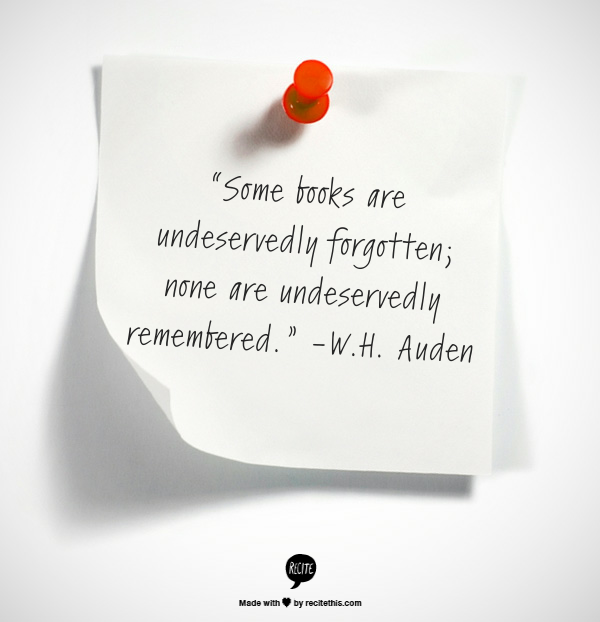
“Choose an author as you choose a friend.”
–Wentworth Dillon, Lord Roscommon, c. 1633-85, Irish poet and critic, Essay on Translated Verse (1684) l. 96
“No furniture is so charming as books.”
–Sydney Smith, 1771-1845, English essayist
“All books are either dreams or swords,
You can cut, or you can drug, with words.”
–Amy Lowell, 1874-1925, American poet, ‘Sword Blades and Poppy Seed’ (1914)
“Only connect! … Only connect the prose and the passion, and both will be exalted, and human love will be seen at its height.”
–E.M. Forster, 1879-1970, English novelist, Howard’s End (1910), ch. 22
“A good book is the best of friends, the same to-day and for ever.”
–Martin Tupper, 1810-89, English writer
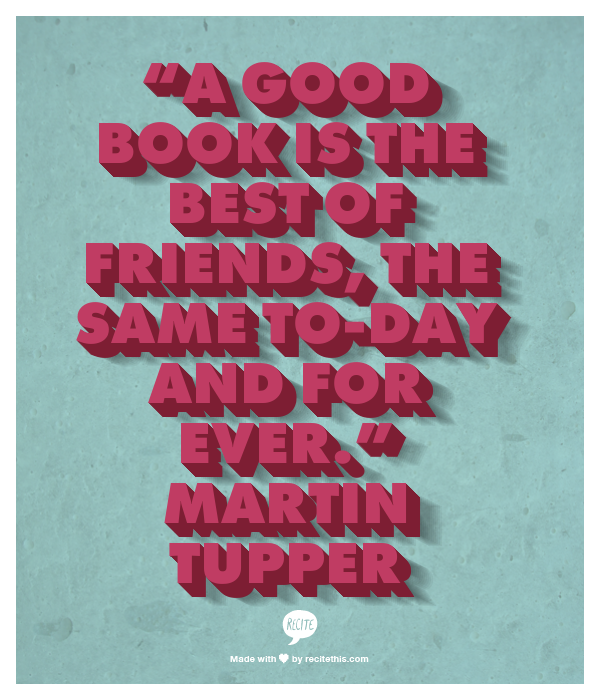
“Some books are to be tasted, others to be swallowed, and some few to be chewed and digested.”
–Francis Bacon, 1561-1626, English courtier
“There is more treasure in books than in all the pirates’ loot on Treasure Island.”
–Walt Disney, 1901-66, American film producer
“There is no book so bad that some good cannot be got out of it.”
–Pliny the Elder, AD 23-79, Roman senator
“I hate books; they only teach us to talk about things we know nothing about.”
–Jean-Jacques Rousseau, 1712-78, French philosopher
“All books are divisible into two classes, the books of the hour, and the books of all time.”
–John Ruskin, 1819-1900, English critic
Ever since the first edition of the Oxford Dictionary of Quotations published over 70 years ago, this bestselling book has remained unrivalled in its coverage of quotations both past and present. Drawing on Oxford’s dictionary research program and unique language monitoring, over 700 new quotations have been added to this eighth edition from authors ranging from St Joan of Arc and Coco Chanel to Albrecht Durer and Thomas Jefferson.
Subscribe to the OUPblog via email or RSS.
Subscribe to only language articles on the OUPblog via email or RSS.
The post What is a book? appeared first on OUPblog.


By: Maggie Belnap,
on 5/19/2014
Blog:
OUPblog
(
Login to Add to MyJacketFlap)
JacketFlap tags:
Online products,
Prince Albert,
Rhetoric & Quotations,
of queen,
attachment_67257,
attachment_67234,
hayter,
wedding,
History,
canada,
quotations,
victoria,
British,
queen,
queen victoria,
Oxford Reference,
oxford dictionary of quotations,
British history,
Victoria Day,
*Featured,
Add a tag
Monday, 19 May is Victoria Day in Canada, which celebrates the 195th birthday of Queen Victoria on 24 May 1819. In June 1837, at the age of 18, Victoria became Queen of the United Kingdom of Great Britain and Ireland, as the Empire was called then.
Queen Victoria would reign for more than 63 years, longer than any other British Monarch to date. The Victorian Era, as it came to be known, was a time of expansion of the British Empire, as well as modernization and innovation following the Industrial Revolution of the early 19th century.
To celebrate Victoria Day, we’ve chosen a few of her most famous quotations to illustrate her life and legacy.
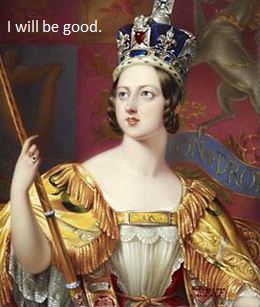
On being shown a chart of the line of succession, 11 March 1830
Theodore Martin The Prince Consort (1875) vol. 1, ch. 2
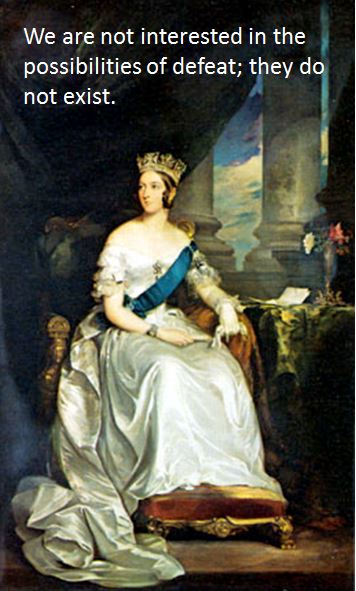
On the Boer War during ‘Black Week’, December 1899
Lady Gwendolen Cecil Life of Robert, Marquis of Salisbury (1931) vol. 3, ch. 6
“The Queen is most anxious to enlist every one who can speak or write to join in checking this mad, wicked folly of ‘Women’s Rights,’ with all its attendant horrors, on which her poor feeble sex is bent, forgetting every sense of womanly feeling and propriety.”
–Queen Victoria, letter to Theodore Martin, 29 May 1870. From Oxford Essential Quotations.
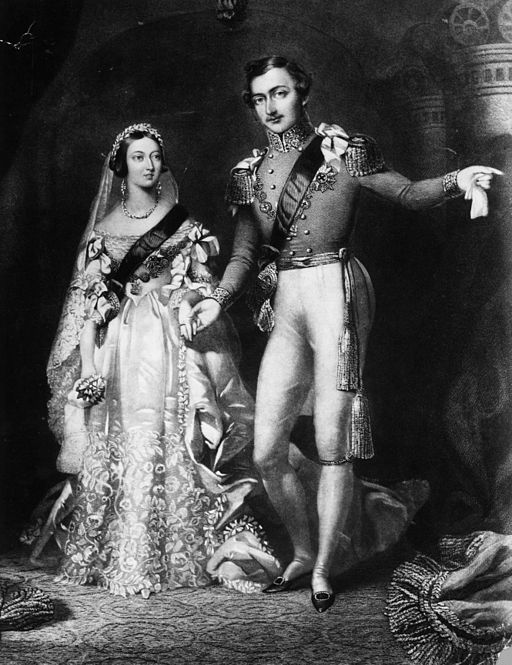
“What you say of the pride of giving life to an immortal soul is very fine, dear, but I own I can not enter into that; I think much more of our being like a cow or a dog at such moments; when our poor nature becomes so very animal and unecstatic.”
–Queen Victoria, letter to the Princess Royal, 15 June 1858. From Oxford Essential Quotations.
The Little Oxford Dictionary of Quotations (5th ed), edited by Susan Ratcliffe, was published in October 2012. The Oxford Dictionary of Quotations (7th ed), edited by Elizabeth Knowles, was published in 2009 to celebrate its 70th year.
Oxford Reference is the home of reference publishing at Oxford. With over 16,000 photographs, maps, tables, diagrams and a quick and speedy search, Oxford Reference saves you time while enhancing and complementing your work.
Images: 1. Queen Victoria in her Coronation Robes by George Hayter. Public Domain via Wikimedia Commons. 2. Portrait of Queen Victoria, 1843 by Sir Francis Grant. Public Domain via Wikimedia Commons. 3. Wedding of Queen Victoria and Prince Albert engraved by S Reynolds after F Lock. Public Domain via Wikimedia Commons.
Subscribe to the OUPblog via email or RSS.
Subscribe to only history articles on the OUPblog via email or RSS.
The post Celebrating Victoria Day appeared first on OUPblog.


By: RachelM,
on 11/30/2012
Blog:
OUPblog
(
Login to Add to MyJacketFlap)
JacketFlap tags:
douglas dunn,
harry lauder,
hugh macdiarmid,
j m barrie,
Little Oxford Dictionary of Quotations,
norman mccraig,
roy williamson,
scottish quotations,
St Andrew's Day,
1942– scottish,
nbsp,
Literature,
quotations,
oupblog,
Dictionaries,
dictionary,
scots,
quote,
scottish,
scotland,
sir walter scott,
odnb,
wordsmiths,
robert burns,
oxford dictionary of quotations,
Humanities,
bonnie,
*Featured,
Lexicography & Language,
oxford dictionary of national biography,
robert crawford,
Add a tag
30 November is St Andrew’s Day, but who was St Andrew? The apostle and patron saint of Scotland, Andrew was a fisherman from Capernaum in Galilee. He is rather a mysterious figure, and you can read more about him in the Oxford Dictionary of National Biography. St Andrew’s Day is well-established and widely celebrated by Scots around the world. To mark the occasion, we have selected quotations from some of Scotland’s most treasured wordsmiths, using the bestselling Oxford Dictionary of Quotations and the Little Oxford Dictionary of Quotations.
There are few more impressive sights in the world than a Scotsman on the make.
J. M. Barrie 1860-1937 Scottish writer
From the lone shielding of the misty island
Mountains divide us, and the waste of seas –
Yet still the blood is strong, the heart is Highland,
And we in dreams behold the Hebrides!
John Galt 1779-1839 Scottish writer
O Caledonia! Stern and wild,
Meet nurse for a poetic child!
Sir Walter Scott 1771-1832 Scottish novelist
O flower of Scotland, when will we see your like again,
that fought and died for your wee bit hill and glen
and stood against him, proud Edward’s army,
and sent him homeward tae think again.
Roy Williamson 1936-90 Scottish folksinger and musician
I love a lassie, a bonnie, bonnie lassie,
She’s as pure as the lily in the dell.
She’s as sweet as the heather, the bonnie bloomin’ heather –
Mary, ma Scotch Bluebell.
Harry Lauder 1870-1950 Scottish music-hall entertainer
My poems should be Clyde-built, crude and sure,
With images of those dole-deployed
To honour the indomitable Reds,
Clydesiders of slant steel and angled cranes;
A poetry of nuts and bolts, born, bred,
Embattled by the Clyde, tight and impure.
Douglas Dunn 1942– Scottish poet
Who owns this landscape?
The millionaire who bought it or
the poacher staggering downhill in the early morning
with a deer on his back?
Norman McCaig 1910–96 Scottish poet
The Little Oxford Dictionary of Quotations fifth edition was published in October this year and is edited by Susan Ratcliffe. The Oxford Dictionary of Quotations seventh edition was published in 2009 to celebrate its 70th year. The ODQ is edited by Elizabeth Knowles.
The Oxford DNB online has made the above-linked lives free to access for a limited time. The ODNB is freely available via public libraries across the UK. Libraries offer ‘remote access’ allowing members to log-on to the complete dictionary, for free, from home (or any other computer) twenty-four hours a day. In addition to 58,000 life stories, the ODNB offers a free, twice monthly biography podcast with over 130 life stories now available. You can also sign up for Life of the Day, a topical biography delivered to your inbox, or follow @ODNB on Twitter for people in the news.
Subscribe to the OUPblog via email or RSS.
Subscribe to only language, lexicography, word, etymology, and dictionary articles on the OUPblog via email or RSS.
View more about the Little Oxford Dictionary of Quotations on the 

View more about the Oxford Dictionary of Quotations on the 



By: LaurenA,
on 9/18/2009
Blog:
OUPblog
(
Login to Add to MyJacketFlap)
JacketFlap tags:
Quotations,
Paris,
A-Featured,
Dictionaries,
paris hilton,
of,
Dictionary,
Dress,
quote,
Leisure,
go,
Quotation,
you,
oxford dictionary of quotations,
Dress cute wherever you go,
Hilton,
wherever,
History,
cute,
Literature,
Reference,
Oxford,
Add a tag
Lauren, Publicity Assistant
For years, the public has not been able to get enough of Paris Hilton. She’s famous as a socialite, heiress, model, and now for joining the likes of Socrates and Mark Twain on the pages of the  Oxford Dictionary of Quotations. No, she’s not quoted for saying, “That’s hot.” Ms. Hilton is instead immortalized for her advice, “Dress cute wherever you go. Life is too short to blend in.”
Oxford Dictionary of Quotations. No, she’s not quoted for saying, “That’s hot.” Ms. Hilton is instead immortalized for her advice, “Dress cute wherever you go. Life is too short to blend in.”
But Paris’s entry is only one of more than 20,000 new quotations added to 7th edition. Other notable inclusions come from Sarah Palin, Stephen Hawking, Aung San Suu Kyi, and Philip Pullman. Here, Oxford Dictionary of Quotations editor Elizabeth Knowles reflects on the history of the almost 70-year-old treasury, and how new entries are chosen. To learn more check out the companion site here.
A classic reference book like this has to be regularly remade, without compromising its essential identity. Can we in fact have the modern and frivolous without damaging our book? I would say most definitely yes, where usage so dictates, and adduce in support two luminaries of the Oxford University Press of over sixty years ago. In 1931, planning the book, Kenneth Sisam, who identified an “intelligent elasticity” as an essential editorial quality, wrote to a colleague, “We shall have to guard against things quotable, as apart from things commonly quoted.” And in 1949, when the second edition was being planned, Humphrey Milford (formerly Publisher to OUP) commented, “I think the levity—comparative—of ODQ is partly the reason for its success.” In other words, the diversity of the book, and its mixture of the deeply serious and the frivolous, based on what people are quoting, is part of its essential nature.
Quotations are part of the fabric of the language: we use, and meet them, every day. We quote when we find that the words of another person, in another time and place, express exactly what we want to say. Or, events bring certain quotations to prominence, as the last year has given new relevance to Thomas Jefferson’s comment that, “Banking establishments are more dangerous than standing armies.”
A dictionary of quotations is not a roll-call of the great and the good, nor a listing of an editor’s favorite passages. Although having said that, of course we all do have items in which we take a particular pleasure. I was especially pleased that the formulation, “We must guard even our enemies against injustice” (attributed to the radical Tom Paine) was revealed as the writer Graham Greene’s paraphrase of Paine’s more formal eighteenth-century diction. The history of this misquotation—linking two significant figures across the centuries, and coming to light through its resonance today—was very satisfying to explore.
At Oxford, we track language to ensure that we have the quotations people are most likely to look up, so that the next time a half-remembered quotation is on the tip of your tongue, the Oxford Dictionary of Quotations is ready with the answer. Inclusion is based on usage: evidence that a spoken comment or written passage is being quoted by others. And while there is a common quotations stock (Shakespeare, the Bible), we all have our own quotations vocabulary, that which we remember and quote because we encountered them at a time when they were particularly significant. The antique and serious often rubs shoulders with popular culture. The same newspaper column, for example, may quote from both the Book of Common Prayer and the Rolling Stones. The result is marvelously diverse, and properly so.


By: Kirsty,
on 9/10/2009
Blog:
OUPblog
(
Login to Add to MyJacketFlap)
JacketFlap tags:
History,
Literature,
Reference,
UK,
quotations,
poll,
A-Featured,
Leisure,
waterstones,
oxford dictionary of quotations,
elizabeth knowles,
Add a tag

Today, Thursday 10th September, sees the UK publication of the new, seventh edition of The Oxford Dictionary of Quotations, edited by Elizabeth Knowles.
To celebrate, OUP have teamed up with Waterstone’s to conduct a national poll asking what Britain’s favourite memorable quotation is. Below is a selection of the thirty quotes you can choose from, as well as details about how to take part.
Classic Quotes
It is a truth universally acknowledged, that a single man in possession of a good fortune, must be in want of a wife.
Jane Austen
The best laid schemes o’ mice an’ men…
Robert Burns
1940s and 50s
I have nothing to offer but blood, toil, tears, and sweat.
Winston Churchill
The past is a foreign country: they do things differently there.
L. P. Hartley
 1960s and 70s
1960s and 70s
I have a dream that my four little children will one day live in a nation where they will not be judged on the colour of their skin
Martin Luther King
The Answer to the Great Question Of…Life, the Universe and Everything…
[is] forty-two.
Douglas Adams
1980s and 1990s
There were three of us in this marriage, so it was a bit crowded
Diana, Princess of Wales
I’ll have what she’s having
When Harry Met Sally, Nora Ephron
2000s
We have not found any smoking guns
Hans Blix
The arc of history is long but it bends towards justice
Barack Obama
British readers can vote in the poll via the Waterstone’s website, and Waterstone’s loyalty card holders are also able to enter a prize draw to win a luxury stay in Oxford. So, what’s your favourite quotation? Tell us below.


By: Kirsty,
on 7/30/2009
Blog:
OUPblog
(
Login to Add to MyJacketFlap)
JacketFlap tags:
Poetry,
Reference,
UK,
weather,
rain,
A-Featured,
Dictionaries,
Prose,
oxford dictionary of quotations,
Add a tag

Those of you acquainted with British weather will know that we do not have the hottest of climates. However, The Met Office reliably informed us earlier this year that this summer we  were actually in for a bit of a scorcher (by UK standards, you understand). A collective cheer went up, and across the land barbeques and garden furniture were put on stand-by, ready for that first gleam of sun. The signs were good. We had - oooh - a week of 30+ degrees! And then it started raining again.
were actually in for a bit of a scorcher (by UK standards, you understand). A collective cheer went up, and across the land barbeques and garden furniture were put on stand-by, ready for that first gleam of sun. The signs were good. We had - oooh - a week of 30+ degrees! And then it started raining again.
This week The Met Office officially revised its estimates of the kind of summer we could expect here in Blighty… and it’s considerably less exciting than previously hoped. Sure enough, as I sit and type this on a July afternoon in Oxford, the rain is beating off the windows with no sign of abating. With that in mind, I bring you some of my favourite rain-related quotes from The Oxford Dictionary of Quotations (new, seventh edition publishing in the UK in September). Now, where’s me brolly… ?
Whoso boasteth himself of a false gift is like clouds and wind without rain.
The Bible, Proverbs ch. 25, v. 11
It lessened my esteem of a king, that he should not be able to command the rain.
Samuel Pepys, Diary, 19 July 1662
Any party which takes credit for the rain must not be surprised if its opponents blame it for the drought.
Dwight Morrow, American lawyer, banker, and diplomat (attributed)
The drop of rain maketh a hole in the stone, not by violence, but by oft falling.
Hugh Latimer, English Protestant martyr, 19 April 1549
She faded, like a cloud which had outwept its rain.
Percy Bysshe Shelley, Adonais, st. 10, 1821
If in February there be no rain, ’tis neither good for hay nor grain.
early 18th century proverb
We swing ungirded hips,
And lightened are our eyes,
The rain is on our lips,
We do not run for prize.
Charles Hamilton Sorley, English poet, Song of the Ungirt Runners, 1916
It was a real slow walk in a real sad rain.
Johnny Cash, Drive On, 1993
And ghastly through the drizzling rain
On the bald streets breaks the blank day.
Alfred, Lord Tennyson, In Memoriam A.H.H., canto 7 (1850)
A duller spectacle this earth of ours has not to show than a rainy Sunday in London.
Thomas De Quincey, English essayist and critic, Confessions of an English Opium Eater, 1822 (ed. 1856)
She was the kind of wife who looks out of her front door in the morning and, if it’s raining, apologizes.
Fay Weldon, British novelist and screenwriter, Heart of the Country, 1987
My face looks like a wedding-cake left out in the rain.
W.H. Auden, quoted in Humphrey Carpenter, W.H. Auden, ch. 6, 1981


By: Kirsty,
on 6/25/2009
Blog:
OUPblog
(
Login to Add to MyJacketFlap)
JacketFlap tags:
sport,
Reference,
UK,
tennis,
quotations,
A-Featured,
Leisure,
wimbledon,
andy murray,
oxford dictionary of quotations,
serena williams,
Add a tag

Wimbledon started this week, and many British eyes are on Andy Murray, who has a decent chance of being the first British Men’s Singles Winner since Fred Perry in 1936. So, no pressure then. Anyway, with the sun shining in England (for once), the strawberries in season, and the tennis on the telly, I thought I’d bring you a selection of tennis (and sport) related entries from The Oxford Dictionary of Quotations. These are from the 6th edition, but we have the lovely new seventh edition publishing in Britain in September.
a decent chance of being the first British Men’s Singles Winner since Fred Perry in 1936. So, no pressure then. Anyway, with the sun shining in England (for once), the strawberries in season, and the tennis on the telly, I thought I’d bring you a selection of tennis (and sport) related entries from The Oxford Dictionary of Quotations. These are from the 6th edition, but we have the lovely new seventh edition publishing in Britain in September.
“We are merely the stars’ tennis-balls, struck and bandied
Which way please them.”
John Webster, The Duchess of Malfi (1623) act 5, sc. 4
“If you can keep playing tennis when somebody is shooting a gun down the street, that’s concentration. I didn’t grow up playing at the country club.”
Serena Williams, Sunday Times (2 June 2002)
“I’d as soon write free verse as play tennis with the net down.”
Robert Frost, quoted in Interviews with Robert Frost (1966)
“When we have matched our rackets to these balls,
We will in France, by God’s grace, play a set
Shall strike his father’s crown into the hazard.”
William Shakespeare, Henry V (1599) act 1, sc. 2
“Years ago we discovered the exact point, the dead centre of middle age. It occurs when you are too young to take up golf and too old to rush up to the net.”
Franklin P. Adams, Nods and Becks (1944)
“He played the King as thought under momentary apprehension that someone else was about to play the ace.”
Eugene Field, in a review of Creston Clarke as King Lear, Denver Tribune (c.1880)
“Many a good run I have in my sleep. Many a dig in the ribs I gives Mrs J when I think they’re running into the warmint… No man is fit to be called a sportsman wot doesn’t kick his wife out of bed on haverage once in three weeks!”
R.S. Surtees, Handley Cross (1843)
“A sportsman is a man who, every now and then, simply has to get out and kill something. Not that he’s cruel. He wouldn’t hurt a fly. It’s not big enough.”
Stephen Leacock, My Remarkable Uncle (1942)



















